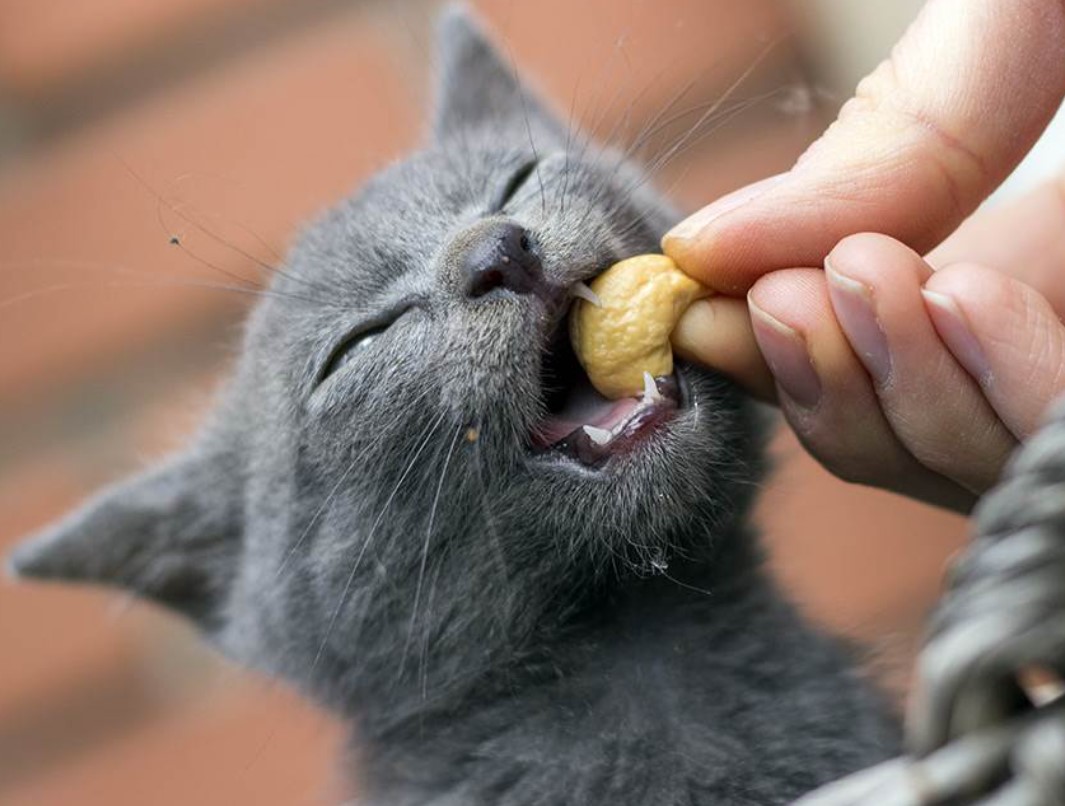Can cats eat cashews? Are cashews toxic to cats?
“Can cats eat cashews?” is a common question among pet owners curious about sharing snacks with their feline friends. While cashews are a tasty treat for humans, they aren’t a suitable food for cats. Cats are obligate carnivores, meaning their diet should primarily consist of animal proteins. Cashews, which are high in fat, can cause digestive issues like vomiting, diarrhea, or even more severe health problems such as pancreatitis in cats. Learn more about the potential risks of feeding cashews to your cat and why it’s best to stick to cat-safe treats. Follow Cat Memorial Stones !!
Can cats eat cashews? Are cashews toxic to cats?

Cashews are not toxic to cats, but they are not recommended as part of their diet.
Cashews are not poisonous to cats in the way that chocolate or onions are. However, they can pose several health risks if eaten in large quantities or regularly. Cats are obligate carnivores, which means their bodies are designed to thrive on animal-based proteins and fats. Their digestive systems are not well-equipped to handle plant-based foods, particularly nuts like cashews.
Why Cashews Aren’t Ideal for Cats
Here are a few reasons why feeding cashews to your cat is not a good idea:
- High Fat Content
Cashews are high in fats, particularly oils that can be hard for cats to digest. A diet too rich in fats can lead to obesity, pancreatitis, and other digestive issues in felines.
- Digestive Problems
Cashews contain high levels of fats and proteins that are difficult for a cat’s digestive system to process. This could result in gastrointestinal upset, including vomiting, diarrhea, or even constipation.
- Risk of Choking or Blockage
Cashews are relatively large and can be a choking hazard, especially if they are whole. Additionally, cats may struggle to chew or swallow nuts properly, which increases the risk of intestinal blockages.
- Nutritional Mismatch
Cats require specific nutrients like taurine, arachidonic acid, and animal-based proteins. Cashews do not provide these essential nutrients and may displace healthier, more suitable foods from their diet if fed regularly.
- Allergic Reactions
Although rare, some cats may have an allergy to nuts, including cashews. Symptoms of a food allergy in cats include itching, swelling, skin irritations, and difficulty breathing. If you notice any of these signs, you should contact a vet immediately.
>>> Click Can cats eat doritos? Can doritos kill cats?
What Happens if My Cat Eats a Cashew?

If your cat eats a small amount of cashew, there’s generally no need to panic. A single cashew or a small piece isn’t likely to cause any serious health issues, but you should still monitor your pet for signs of digestive discomfort, such as vomiting or diarrhea.
However, if your cat eats a larger amount of cashews, or if it becomes a regular habit, there could be more serious consequences like:
- Pancreatitis
The high-fat content in cashews can lead to inflammation of the pancreas, which can cause severe abdominal pain, vomiting, and loss of appetite. Pancreatitis requires immediate veterinary attention. - Weight Gain and Obesity
Feeding cats fatty foods like cashews can lead to obesity, which in turn can cause joint problems, diabetes, and other long-term health issues.
What Should You Do If Your Cat Eats Cashews?
If your cat has eaten one or two cashews and is showing no signs of distress, it’s usually safe to monitor them for the next 24-48 hours. However, if your cat exhibits any unusual symptoms, such as:
- Persistent vomiting
- Diarrhea
- Lethargy
- Signs of abdominal pain or discomfort
You should contact your vet immediately for advice.
Safe Alternatives to Cashews for Cats
If you’re looking for safe snacks to treat your cat, there are plenty of options that are better suited to their nutritional needs. Here are some vet-approved treats:
- Cooked, Lean Meats
Small pieces of cooked chicken, turkey, or lean beef make excellent treats that align with your cat’s natural dietary requirements.
- Catnip and Cat Grass
Many cats love catnip or cat grass, which can provide a fun and safe alternative to human foods.
- Commercial Cat Treats
There are numerous cat treats on the market formulated to meet a cat’s dietary needs. Look for treats that are low in calories and high in protein.
Conclusion
While cashews are not toxic to cats, they are not a suitable snack due to their high fat content, difficulty in digestion, and potential health risks. It’s best to stick to foods that are specifically designed for your cat’s dietary needs. If you’re ever in doubt about what human foods are safe for your feline friend, it’s always best to consult with your veterinarian.

FAQs
Can cats eat roasted cashews?
Cats should not eat roasted cashews. While cashews are not toxic to cats, they are high in fat and can cause digestive upset, including vomiting and diarrhea, if consumed in significant amounts. Cats are obligate carnivores, meaning their diet should primarily consist of animal-based proteins, and foods like cashews can lead to issues such as pancreatitis if fed regularly.
Can cats have salted cashews?
Cats should not have salted cashews. The salt content in these nuts can be harmful to cats. Too much salt can lead to salt poisoning, which may cause symptoms like vomiting, diarrhea, lethargy, excessive thirst, and in severe cases, even seizures or death.
>>> Read: Can cats eat dates? Are Dates Safe for Cats?
Can cats eat cashew yogurt?
Cats should not eat cashew yogurt. While cashew yogurt is dairy-free, which avoids the lactose issue common with regular yogurt, it is still made from cashews, which are high in fat and not suitable for cats. Additionally, some commercial cashew yogurts may contain added sugars, artificial flavors, or other ingredients that could be harmful to cats.
Cats are obligate carnivores and require animal-based proteins in their diet. Treats like plain, unflavored, unsweetened yogurt made from animal milk (if your cat is not lactose intolerant) may be better options, but even then, only in moderation. Always consult your vet before introducing any new food to your cat’s diet.
Can cats eat raw cashews?
Cats should not eat raw cashews. While raw cashews are not toxic to cats, they are still high in fat, which can lead to digestive issues like vomiting, diarrhea, or pancreatitis if consumed in large amounts. Cats are obligate carnivores and don’t have a natural ability to process nuts well, so cashews offer little nutritional value for them.
Can kittens eat cashews?
Kittens should not eat cashews. Cashews, whether raw, roasted, or salted, are high in fat and can cause digestive issues in kittens, including stomach upset, vomiting, diarrhea, and even more severe conditions like pancreatitis. Kittens, like adult cats, are obligate carnivores and require a diet primarily based on animal proteins, which cashews do not provide.
At such a young age, kittens need specially formulated food to support their growth and development. It’s best to avoid giving them any human food, including cashews, and stick to a balanced, veterinarian-approved diet.
Can cats have cashew milk?
Cats should not have cashew milk. While cashew milk is dairy-free, it is still not an ideal choice for cats because it lacks the essential nutrients they need and may contain added sugars, flavors, or preservatives that could be harmful. Additionally, cashews are high in fat, which can upset a cat’s digestive system and lead to issues like vomiting or diarrhea.
